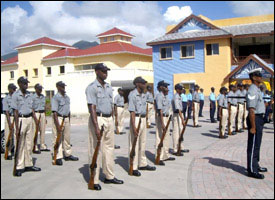
St. Kitts – Nevis Police Officers
Photo By Erasmus Williams
Basseterre, St. Kitts – Nevis
December 06, 2012 (SKNIS)
The recent forensic training received by members of the Royal St. Christopher and Nevis Police Force will result in a number of changes in the way crime scenes are investigated and processed.
Constable Detective Trevéron Richards of the Criminal Investigation Department told SKNIS that the High Command is “modernizing” the agency and “revolutionizing” crime fighting techniques. The main strategy to achieve this involves advanced training for officers and upgrading of equipment.
One such training opportunity took place last week. Richards participated in the five-day crime scene training for evidence technicians which was facilitated by Sergeant Investigator Anita Seamans of the Live Oak Police Department in Texas. It was held under the directorship of Major Coleman of the United States’ Department of Justice.
“The one thing … that stood out from the course was our management of crime scenes,” Detective Richards stated. “Usually we would hold a crime scene for a relatively short period, 24 hours or 48 hours at most, but from this course we learnt that you need to hold that scene for as long as you feel that you can recover evidence …”
Securing an enclosed space in a building for a longer period is relatively simple but the challenges posed by an outdoor space, such as on the side of the road or in an alley, is likely to be more problematic.
“Yes it would be,” the police constable agreed. “It means now that we have to take the initiative in finding ways, not just in our methods of collecting evidence, but the time we dedicate to collecting that evidence.”
Detective Richards also highlighted the challenges posed by crowds that gather after an incident occurs in a public area.
“We have to move the line (police tape) back as far as possible because it’s easy for someone, even outside the boundaries, to contaminate the crime scene and … you don’t want any contamination of the crime scene whatsoever especially by bystanders.”
“We are asking for your cooperation,” he continued, addressing the public. “If we ask you to move back, we are not asking you to move back because we don’t want you to observe what’s going on, but we want you to move back because we feel that the wider we spread the area, the more evidence we may be able to gather and be better able to solve whatever crime may have taken place.”
Constable Richards is currently participating in another five-day training but this time the topic is Homicide Investigation. The workshop is being held at the Police Training Complex.